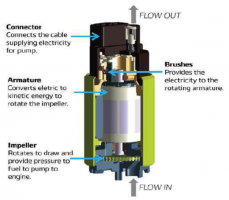— A Toyota fuel pump recall fix is allegedly not good enough, took too long to be announced and doesn't fix all the Toyota and Lexus vehicles equipped with defective DENSO fuel pumps.
The class action lawsuit alleges previous fuel pump recalls did include the following vehicles, but the automaker allegedly sells additional vehicles equipped with defective fuel pumps with part numbers that begin with 23220 and 23221.
- 2013-2015 Lexus LS 460
- 2013-2014 Lexus GS 350
- 2014 Toyota FJ Cruiser
- 2014 Lexus IS-F
- 2014-2015 Toyota 4Runner
- 2014-2015 Toyota Land Cruiser
- 2014-2015 Lexus GX 460
- 2014-2015 Lexus IS 350
- 2014-2015 Lexus LX 570
- 2015 Lexus NX 200t
- 2015 Lexus RC 350
- 2017 Lexus IS 200t
- 2015 Lexus RC 200t
- 2017-2019 Toyota Sienna
- 2017-2019 Lexus RX 350
- 2018 Lexus GS 300
- 2018-2019 Toyota Avalon
- 2018-2019 Toyota Camry
- 2018-2019 Toyota Corolla
- 2018-2019 Toyota Highlander
- 2018-2019 Toyota Sequoia
- 2018-2019 Toyota Tacoma
- 2018-2019 Toyota Tundra
- 2018-2019 Lexus ES 350
- 2018-2019 Lexus GS 350
- 2018-2019 Lexus IS 300
- 2018-2019 Lexus IS 350
- 2018-2019 Lexus LC 500
- 2018-2019 Lexus LC 500h
- 2018-2019 Lexus LS 500
- 2018-2019 Lexus LS 500h
- 2018-2019 Lexus RC 300
- 2018-2019 Lexus RC 350
- 2018-2019 Lexus RX 350L
Problems With the Previous Fuel Pump Recall
Two owners filed the class action alleging Toyota should have ordered a recall fix long ago because the automaker allegedly knew in 2013 the fuel pumps were defective.
The previous recalls included nearly 200,000 vehicles, but the plaintiffs claim many owners and lessees are stuck driving vehicles that still need to be fixed.
The fuel system uses two fuel pumps to send fuel to the engine, one a low-pressure in-tank pump and a second high-pressure in-line pump. The defective fuel pumps are located in the fuel tanks, and impellers located under the pump motors rotate and draws fuel and sends it up through the pumps.
According to the Toyota fuel pump recalls, the impellers are low-density and were exposed to production solvent drying for long periods of time. This causes cracks to occur and the impellers may absorb fuel to the point the impellers deform.
Severe deformation can cause the impeller to make contact with the body of the fuel pump.
The problem was mentioned in a DENSO patent application in 2016:
The pumps “may be swelled due to the fuel and water contained in the fuel, [and] therefore a rotation of the impeller may be stopped when the impeller is swelled and comes in contact with the [fuel pump] housing.”
This can cause the fuel pumps to have problems or even completely fail, leading to engines that don't run properly, engines that can't be started or stalled engines while driving.
The Toyota fuel pump recall fix involves the automaker replacing the pumps with improved pumps.
The lawsuit says all affected Toyota and Lexus customers should receive refunds of the purchase prices of the vehicles and be compensated for overpaying for vehicles that allegedly lose their values. According to the lawsuit, Toyota should be ordered to replace or recall and fix all the affected vehicles.
The Toyota fuel pump lawsuit was filed in the U.S. District Court for the District of New Jersey: Ruis, et al., v. Toyota Motor Corp., et al.
The plaintiffs are represented by Seeger Weiss LLP.
CarComplaints.com has complaints about the vehicles named in the fuel pump class action lawsuit.
- Lexus LS 460
- Lexus GS 350
- Toyota FJ Cruiser
- Lexus IS-F
- Toyota 4Runner
- Toyota Land Cruiser
- Lexus GX 460
- Lexus IS 350
- Lexus LX 570
- Lexus NX 200t
- Lexus RC 350
- Lexus IS 200t
- Lexus RC 200t
- Toyota Sienna
- Lexus RX 350
- Lexus GS 300
- Toyota Avalon
- Toyota Camry
- Toyota Corolla
- Toyota Highlander
- Toyota Sequoia
- Toyota Tacoma
- Toyota Tundra
- Lexus ES 350
- Lexus GS 350
- Lexus IS 300
- Lexus LC 500
- Lexus LS 500
- Lexus LS 500h
- Lexus RC 300

